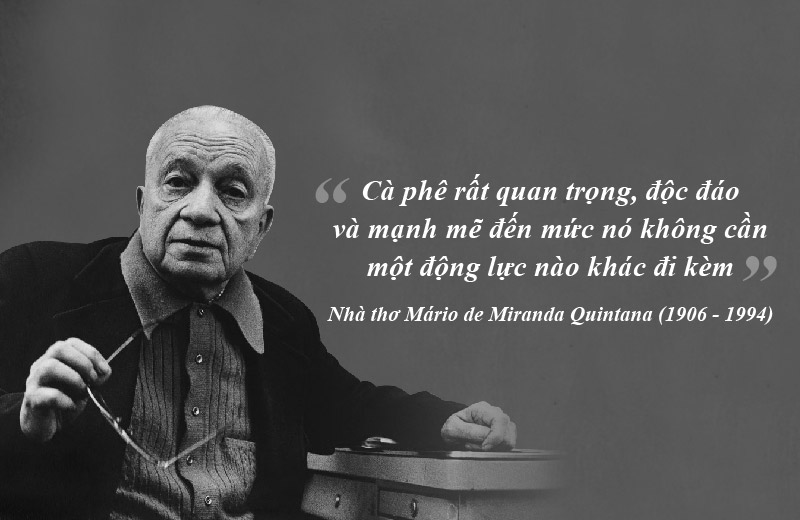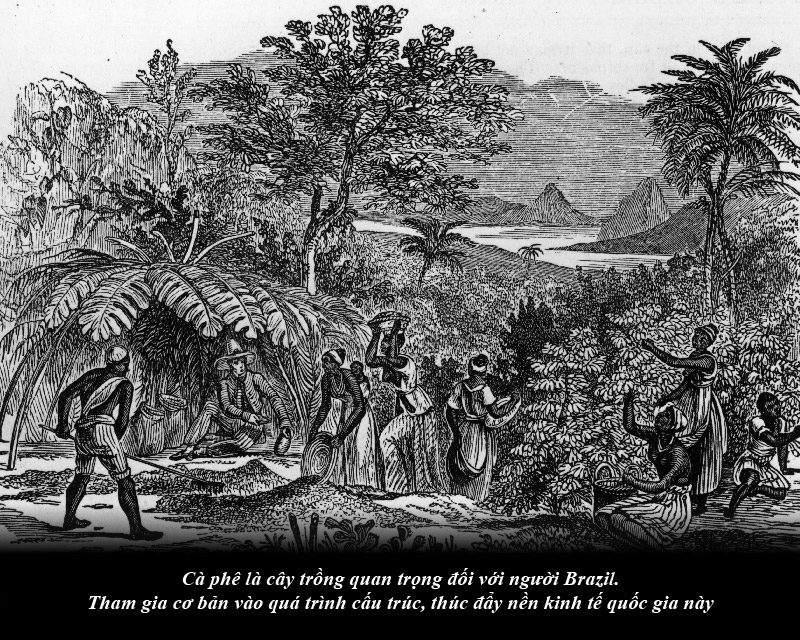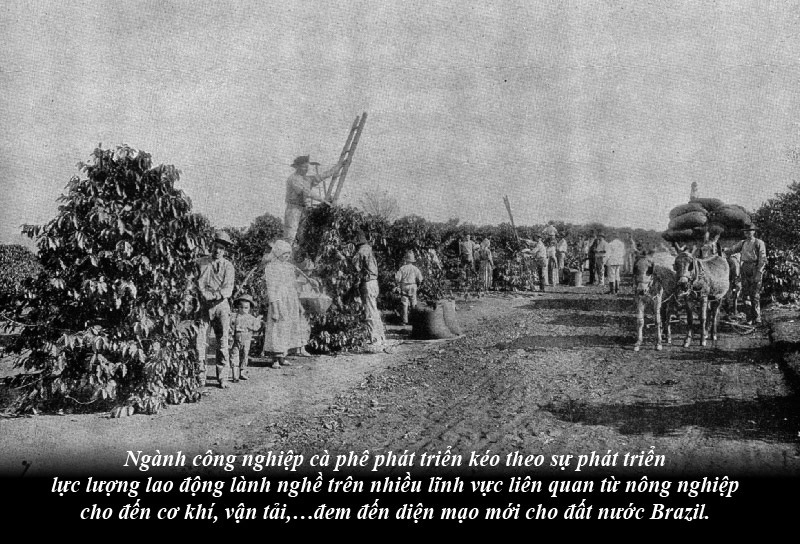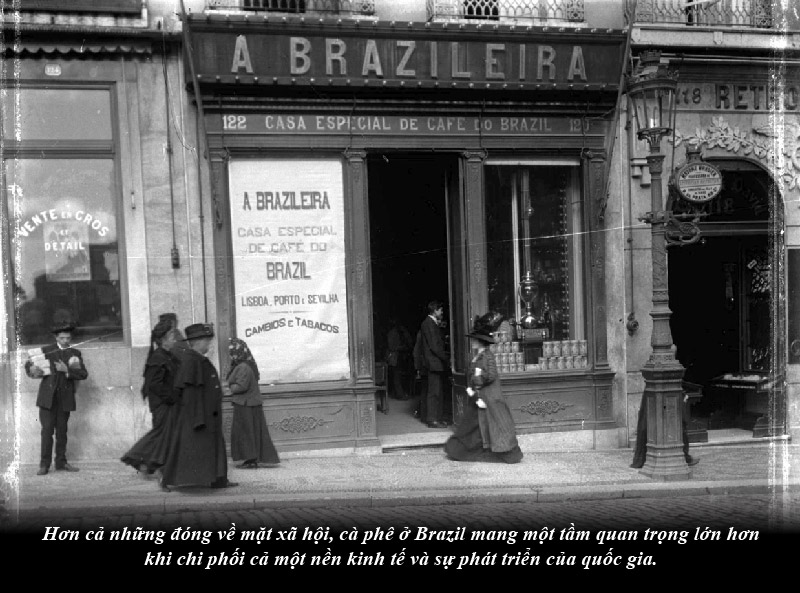Article 63: Brazil from a colony to a world coffee power
Coffee was grown in Brazil for the original purpose of colonial exploitation. However, it is coffee that has become an important factor in promoting the economy, bringing Brazil to the position of a world coffee power.

“Coffee is so important, unique, and powerful that it needs no other motivation.” – Poet Mario de Miranda Quintana (1906-1994)
Coffee seeds opened a new history page for Brazil
Coffee is not a native crop of the Americas. When Brazil became a Portuguese colony, the Portuguese wanted to exploit this potential land to expand the coffee material area. In 1727, the coffee tree was brought by Portuguese Lieutenant Colonel Col Francisco del Melo Palheta from Guinea (France) and planted in Pará, Brazil. That first coffee tree created an important historical turning point in Brazil.

Coffee is an important plant for Brazilians. Participating in the process of structuring and promoting this nation’s economy.
In 1770, coffee continued to be brought to Rio de Janeiro with the goal of producing for domestic consumption. By the years 1830 – 1850, demand from the US and Europe increased, creating the boom in production in the history of Brazilian coffee. Coffee plantations in Rio de Janeiro, São Paulo and Minas Gerais quickly grew and expanded in production, accounting for 30% of world production. Coffee became Brazil’s largest export. During the 1840s, the share of Brazil’s total coffee exports in the world continued to grow to 40%, making Brazil the largest coffee power in the world.

The development of the coffee industry lead to the development of a skilled workforce in many related fields from agriculture to mechanics, transportation, etc., bringing a new face to Brazil.
The second coffee boom in Brazil took place from 1880 to 1930, also known as “café com leite” (coffee and milk) referring to the industries that dominated the largest states, it’s coffee in São Paulo and milk in Minas Gerais. The growth of the coffee industry played an important role in transforming the economy and society, contributing to an era of wealth and progress for many Brazilians. Railway infrastructure was invested and built, banking institutions developed, credit expanded and industrialization attracted investment. Developed industrial zones attracted millions of immigrants. The São Paulo region, once a small town, became the largest industrial center in the developing world.
The face of Brazil completely changed, gradually moving towards industrialization and modernization, leading to the development of a large workforce of skilled workers in many fields. The owners of Brazil’s largest coffee plantations were also influential in social decisions. It even contributed to the proclamation of Brazil as a Republic on November 15, 1889, officially ending the colonial period.
Maintaining the position of a coffee powerhouse in the modern world
To date, coffee has become one of the most valuable commodities in Brazil and one of the main sources of income. In the early 20th century, it was estimated that coffee accounted for 16% of Brazil’s gross national product and three-quarters of export earnings. To achieve that success, in the process of commercializing coffee, the Brazilian government had to promote research and constantly change the geographical division of coffee growing as well as control production to ensure the price of coffee on the market.

More than social contributions, coffee in Brazil takes on a greater importance when it comes to influencing both the economy and the development of the nation.
According to data from the Brazilian Institute of Geography and Statistics, between 1984 and 2015 there were significant changes in the distribution of coffee-producing regions. Areas with a long and major history of coffee growing, such as Paraná and São Paulo, have gradually shifted to the states of Minas Gerais, Bahia, Rondônia and Espírito Santo. In which, Minas Gerais and Bahia mainly produce Arabica coffee beans, Rondônia specializes in Robusta coffee beans. Thanks to constant research and changes, the quality and value of Brazilian coffee beans are increasingly improved, creating a unique mark for the Brazilian coffee brand on the global coffee map.
More than social contributions, coffee in Brazil takes on a greater importance when it comes to influencing the whole economy of the nation. With the successful commercialization of coffee beans over the past 150 years, Brazil has become one of the largest developing economies in the world and coffee has played a large role in the success of its growth and in affirming Brazil’s position.
Not only selecting the best coffee beans from the coffee capital of Buon Ma Thuot (Vietnam) and Brazil’s coffee powerhouse, Trung Nguyen Legend coffee experts also select the best coffee beans coming from the most famous raw material regions in the world such as: Colombia, Ethiopia, Jamaica; combining the most modern technology and mythical Eastern know-how to create unique and special coffee masterpieces, worthy of being the elixir for the brain, the elixir for creativity. Enjoying great energy coffees, reading books from the Life Changing Foundational Bookcase, carefully selected by the Chairman of Trung Nguyen Legend Group, Dang Le Nguyen Vu himself, discussing big ideas and challenges of the times at the coffee shop – which is famously known as the “Sidewalk Academy”, the meeting place of great souls… will help each individual to have the right and comprehensive knowledge power, which will in turn transform into spiritual strength, material strength, physical strength to go to authentic wealth and happiness for each individual and create strength and influence for the people and the nation.
THE REAL COFFEE
ROASTED ONLY FOR PEOPLE OF WISDOM!
Source: “The Philosophical Way of Coffee” – copyright by Trung Nguyen Legend


